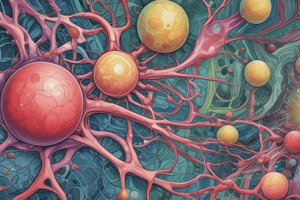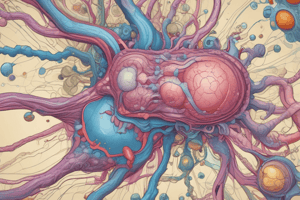Podcast
Questions and Answers
What is the function of the tail in a sperm cell?
What is the function of the tail in a sperm cell?
To aid in swimming
What is the primary function of root hairs in plant cells?
What is the primary function of root hairs in plant cells?
To increase the surface area for water absorption from the soil
What is the purpose of lignin in xylem vessel cell walls?
What is the purpose of lignin in xylem vessel cell walls?
To provide strength and structural support, and make the cell wall impermeable
What is a characteristic of xylem vessel cells?
What is a characteristic of xylem vessel cells?
What is the function of mitochondria in a sperm cell's tail?
What is the function of mitochondria in a sperm cell's tail?
What is the benefit of the hollow lumen in xylem vessels?
What is the benefit of the hollow lumen in xylem vessels?
What is the purpose of root hairs in plant roots?
What is the purpose of root hairs in plant roots?
What is the defining feature of a specialized cell?
What is the defining feature of a specialized cell?
What is an example of a specialized cell in plants?
What is an example of a specialized cell in plants?
What is an example of a specialized cell in animals?
What is an example of a specialized cell in animals?
Flashcards are hidden until you start studying
Study Notes
Goblet and Ciliated Epithelial Cells
- Line lung passages in animals
- Goblet cells produce mucus that traps dust, pathogens, and small particles
- Cilia are small cytoplasmic extensions that move like a wave, carrying mucus out of airways to the back of the throat
Muscle Cells
- Three types: skeletal, cardiac, and smooth
- Elongated with protein fibers that can shorten/contract the cell
- Functions: provide structural support, movement, and generating heat
Red Blood Cells
- Most of blood is made up of these cells
- Red color comes from haemoglobin, which combines with oxygen to form oxyhaemoglobin
- Transport oxygen from lungs to body cells for energy production during respiration
- Biconcave shape and small size allow for large surface area to volume ratio, absorbing more oxygen
- No nucleus, making more room for haemoglobin
Nerve Cells
- Have a long cytoplasmic extension called the axon, carrying electrical impulses
- Axon surrounded by fatty myelin sheath, insulating the fiber for faster impulse travel
Gametes (Sex Cells)
- Sperm and egg cells specialized for reproduction
- Contain only half a set of chromosomes, combining to form a complete set during fertilization
- Surrounded by a layer of protective jelly and a cell surface membrane
- Sperm has a head containing many mitochondria for energy production, a tail for swimming, and a nucleus
Plant Root Hair Cells
- Cytoplasmic extensions from epidermal cells, increasing surface area for water absorption from soil
Xylem Vessels
- Elongated cells, placed end to end, forming a long continuous tube for water transport
- Cell walls thickened with lignin, providing strength and structural support
- Cell walls impermeable, with no cytoplasm, and a hollow lumen for water flow
Studying That Suits You
Use AI to generate personalized quizzes and flashcards to suit your learning preferences.




